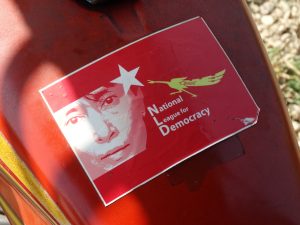As the dust settles on the military’s seizure of power in Myanmar, and the world slowly readjusts and reacts to the new state of play, attention turns to the possible ramifications within the country.
Early on Monday morning, the military upended Myanmar’s democratic system when it arrested State Counselor Aung San Suu Kyi, President Win Myint, and dozens of officials from the ruling National League for Democracy (NLD) party. Shortly afterward, it declared a one-year state of emergency on the pretext of investigating unproven voting fraud allegations from November’s national election, which the NLD won in a landslide.
On Tuesday, the junta unveiled its coup cabinet, which contained a number of familiar faces from the administration of Thein Sein (2011-16), a continuity at apparent odds with the profound effects that the coup is likely to have on Myanmar’s politics. The military takeover has swept away what was left of the international hopes invested in Myanmar’s political opening over the past decade. It could also pave the way to a sweeping crackdown on independent media and activists – a partial return to the stifling era of military rule prior to 2011 – or a new spell of house arrest for Aung San Suu Kyi, whose current whereabouts remain unclear.
Perhaps the greatest question is how the people of Myanmar will react in the weeks and months to come. After a decade in which the many people enjoyed greater – though by no means untrammeled – political freedoms, it remains to be seen whether the democratic genie can be forced back into the bottle.
In the afternoon of the coup, a statement surfaced claiming to be from Aung San Suu Kyi, which urged the people of Myanmar to take to the streets to protest the military takeover. The note, issued in Aung San Suu Kyi’s name on the Facebook page of the NLD leader’s office, urged people “not to accept this, to respond and wholeheartedly to protest against the coup by the military.”
Immediately, some Myanmar observers raised doubts about the statement’s legitimacy, noting that the Facebook page had fallen under the control of the army. Others also noted that the risky call to protest ran counter to the path of more passive resistance that Aung San Suu Kyi has long advocated.
Whatever the legitimacy of the statement, most people seem to be lying low for the time being. The hours after the coup saw people lining up at ATMs in Yangon to withdraw cash: a universal response to political uncertainty. (I recall seeing similar scenes in Cambodia after Prime Minister Hun Sen’s near-defeat at national elections in July 2013.) Amid rumors of a military-imposed curfew, shops closed up and many people stayed at home.
For many of those old enough to remember the old days of junta rule, there was a sense of inevitability. This was reflected in snippets of conversation reported by Aye Min Thant, a Pulitzer prize winning journalist, as she ventured out onto the streets in the hours after the takeover. “It can’t be helped,” she heard one person say. “I told you so. We know them,” said another.
Later, Aye Min Thant wrote a blog post reflecting on the differing perceptions of the older generations, from younger people who have come to age in the post-reform era. “The Tatmadaw is not a rational actor, and that’s something that Myanmar elders understand on a visceral level,” she wrote. “Those of us lucky enough to be young enough to have only passing memories of pre-transition Myanmar are just starting to internalize this.”
While people, young and old, will understandably decide that public demonstrations are too risky, given the military’s proven willingness to shed blood, the possibility of a return to mass protests – or some degree of domestic political instability – cannot be ruled out. From my reporting in the country, I know that Myanmar’s people are proud of their country’s democratization over the past decade, however partial in practice, and its emergence from decades of international isolation under Aung San Suu Kyi’s leadership. The anger about Monday’s events will simmer and build, especially in the context of the economic downturn prompted by COVID-19.
One of the heartening side plots to the week’s events has been the solidarity displayed by pro-democracy protesters in neighboring Thailand, where the hashtag #รัฐประหาร (coup d’etat) began trending on Monday, appended to messages of condemnation and support. Many Thai social media users, no strangers to the persistent interventions of the military into politics, have taken the liberty of enlisting Myanmar into the ranks of the Milk Tea Alliance, an informal anti-authoritarian movement that unites democrats in Thailand, Taiwan, and Hong Kong. In an age of social media, there is a new potential for different national struggles to cross-fertilize and support one another.
Another issue that bears watching is the impact of the military takeover on Myanmar’s tangled web of ethnic conflicts. In many ways, the struggle between the generals and Aung San Suu Kyi has been orthogonal to the broader struggle to build a nation inclusive of the country’s various ethnic minority peoples – the font of the conflicts that have plagued the country since its independence in 1948.
At this stage it is difficult to say what impact the government will have on ethnic relations. Suffice to say, the return to de jure power of the military, the spearhead of the central state’s attempts to subordinate the country’s ethnically diverse periphery to its ethnic Burman-dominated center, can only further inflame the situation in Myanmar’s many conflict regions.

































